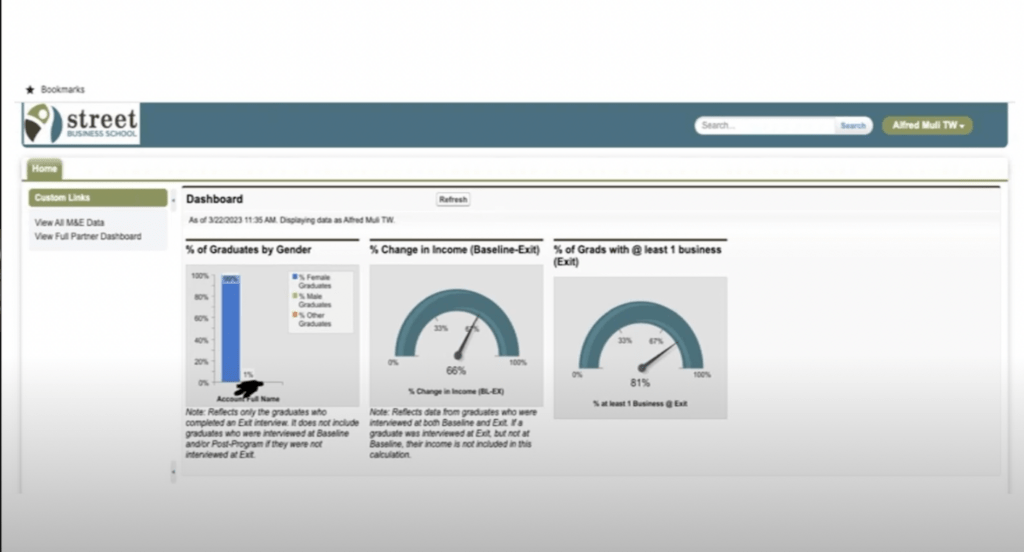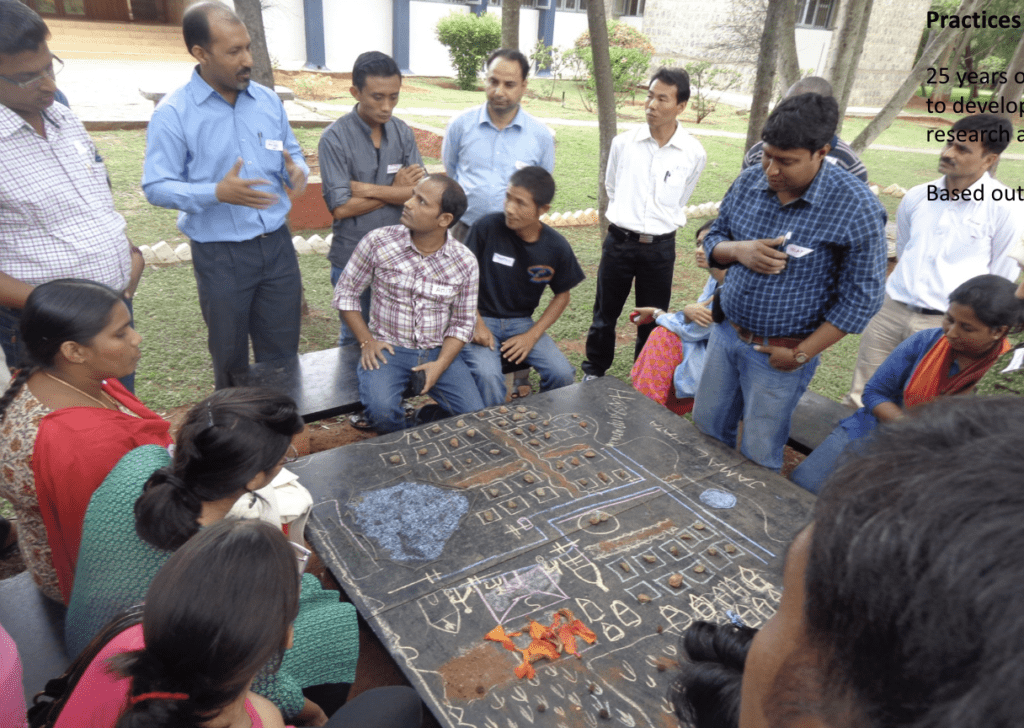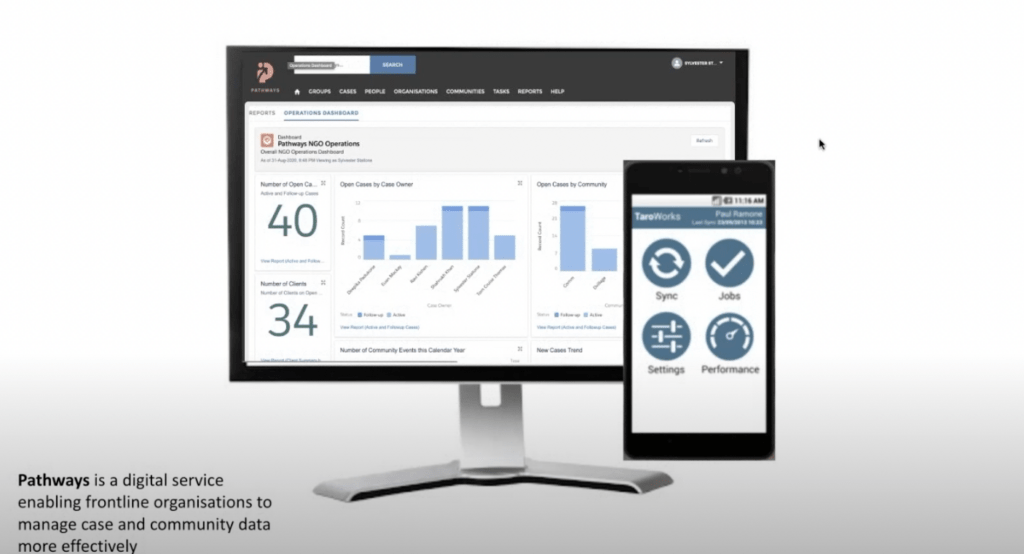
At TaroWorks, we specialize in streamlining field operations and enhancing data transparency for organizations. We work with organizations seeking to empower their mobile users with data, enabling them to make a significant impact at the last mile.
In our pursuit of data-driven decision-making, partnerships play a pivotal role in achieving success. Partner organizations not only drive missions but also provide invaluable local context and knowledge as organizations expand into new territories.

At TaroWorks, we see two different scenarios for scaling with partners.
TaroWorks supports organizations with different partnership models. On March 28, 2023, we were joined by Pragya Shah, Programme Officer at Praxis, and Alfred Muli, M&E Manager at Street Business School to discuss how their organizations use TaroWorks as a service for their partners and how they found a solution to empower their partners to be effective in the field.


Street Business School is an NGO committed to empowering women and uplifting their families from poverty. They do this by equipping women in impoverished conditions with the necessary tools to establish and expand micro-businesses. With a strong emphasis on data-driven decision-making, Street Business School (SBS) has collaborated with 227 partners across 33 countries.
Street Business School implements a social franchising approach instead of maintaining country offices. They share their program methodology and curriculum with community partners, who then adapt and contextualize it to suit the specific needs of their respective communities. Street Business School relies on TaroWorks to facilitate the delivery of its entrepreneurial training to its partners.
Street Business School has developed comprehensive reports and dashboards within its Salesforce CRM to track baseline information, monitor progress, and measure impact. Partner organizations utilize the TaroWorks Community page to access this data in real time.

This empowers partners to retrieve and utilize the data at any time, supporting informed decision-making processes. For instance, Alfred Mulli, M&E Manager, Street Business School, highlighted that “We have many partners who use the TaroWorks Community Page to view charts for fundraising and sharing progress with different stakeholders including donors, staff, and their board.”

Praxis, a non-profit organization dedicated to people-centered research and capacity building, prioritizes amplifying the voices of marginalized communities in their pursuit of equity and governance. Through participatory research, capacity building, and advocacy, Praxis ensures that the most vulnerable and excluded groups actively contribute to development processes.

While Praxis acts as a service provider of case management to their non-profit partners. They collaborate with a team from Pathways, an Information Management System integrated with Salesforce, to aggregate data collected from projects through TaroWorks. Essentially, TaroWorks data flows into Pathways, where it is used to generate reports, surveys, and community information. Pathways performs case management and shares this information with the respective NGOs.
Pathways enables organizations to track the journey of their clients and maintain records of partner organizations and groups within the community. Praxis collaborates with 26 grassroots-level organizations across India, supporting them in facilitating access to government resources and social security for the communities they serve. These partnerships encompass a range of activities, including livelihood support training and other programs aimed at empowering the communities.

To gain deeper insights into how these organizations use TaroWorks as a service for their partners, we organized a panel discussion during the webinar mentioned above. This session allowed each organization to share its experiences and strategies for leveraging TaroWorks effectively. Read the highlights from the panel below:
Streets Business School:
Street Business School uses TaroWorks for on-the-ground data collection. Salesforce serves as the central database for Street Business School, enabling them to visualize the data, extract valuable insights, and share them internally and with their partners.
We use TaroWorks for the process of recruiting the cohorts (entrepreneurs being trained by Street Business School) and for impact data collection. Partners can access their data through the TaroWorks Community portal page. The reports are created in Salesforce and then broadcast there in real time.
Alfred Muli, M&E Manager, Street Business School
Praxis:
At Praxis, TaroWorks facilitates client participation within their partnerships. The app allows field workers to collect data and interact with clients, creating an environment that encourages active involvement. They use TaroWorks as a service provider of case management to their non-profit partners.
The real-time capabilities of Salesforce have been beneficial for their frontline workers, as they can capture and update information immediately. This real-time data empowers frontline workers to provide continuous support to their clients.
“TaroWorks has enabled frontline workers to operate in areas with limited internet connectivity, overcoming previous challenges of reaching certain locations,” said Pragya Shah, Program Officer, Praxis. “TaroWorks provides features that assist desktop users in assigning tasks, setting reminders, and following up on activities. Mobile workers can easily track their tasks, ensuring efficient workflow management.”
Praxis:
Previously, Praxis’ partners were using social media applications like WhatsApp, but with the implementation of TaroWorks and Salesforce, the partners transitioned away from social media. This shift allowed for improved communication, data management, and better collaboration among partners.
“To develop Pathways, we consulted with partners operating in various locations. We wanted to have a comprehensive understanding of their existing case management practices and identify the challenges they encountered,” explained Pragya.
These challenges came from the reliance on paper-based files, which proved susceptible to data loss in disaster-prone areas. Managing multiple files and tracking numerous follow-ups for each case posed considerable difficulties. Through this process, Praxis gained valuable insights into case management.
After developing Pathways, Praxis came to TaroWorks in 2022. This integration significantly expanded the support system available to frontline workers who heavily relied on their mobile devices for updates. The seamless connection between TaroWorks and Pathways proved to be beneficial, streamlining their workflows and enhancing overall efficiency.
Streets Business School:
Similarly to Praxis, Street Business School relied on pen and paper for data collection, which was then manually entered into Excel and later uploaded into Salesforce. While this approach sufficed when the number of partners was limited, it became increasingly overwhelming as they scaled.
“TaroWorks supported us in creating digital forms and facilitating a smooth transition from traditional pen-and-paper methods,” said Alfred Muli. “ For instance, when collecting extensive data on income, the questionnaire could be quite lengthy due to individuals having multiple businesses. However, with TaroWorks, the skip logic functionality was available, enabling respondents to skip irrelevant questions, saving valuable time.”
Street Business School faced the challenge of accommodating diverse partners, ranging from grassroots NGOs to large mulit-national organizations. Some partners operated in urban centers with well-established data collection processes, while others were situated in remote areas with limited internet connectivity. Therefore, the goal was to find an offline data collection app that would cater to the needs of all partners.
To address these requirements, a comprehensive system was built within Salesforce capable of accommodating various data collection processes. Additionally, Salesforce integrated all business processes through Street Business School. This unified system served as a centralized hub, providing teams with convenient access to goals and pertinent information, making it a valuable resource for the organization.
Streets Business School:
As their partner network grew, they recognized the need for a creative approach to support them. Their initial training focused on monitoring and evaluation, with a strong emphasis on data collection. They conducted in-person workshops and held virtual sessions. To ensure continuous engagement and learning among their partners, they organize quarterly refresher training. These sessions foster an environment where partners can share experiences, discuss challenges, and provide assistance to one another.
In case partners encounter difficulties, they also have multiple channels to seek support. Partners have direct relationships with the SBS team, and Street Business School offers dedicated office hours once a month, allowing partners to schedule calls and receive personalized assistance. “We have witnessed significant progress among several partners who initially struggled with TaroWorks but now demonstrate proficiency in utilizing the app,” said Alfred.
Praxis:
During the COVID-19 pandemic, Praxis conducted a series of refresher trainings to support their partners.They continue to maintain regular meetings with partners to stay connected and address any ongoing needs. To enhance training effectiveness, Praxis developed case studies, stories, and role-playing exercises. This approach has proven to be successful as it enables participants to connect with the content and apply their knowledge.
Pragya explained that to streamline coordination, each organization has a designated contact person. Partners also have the option to reach out to the Pathways team for further assistance if needed.
Streets Business School:
“The TaroWorks Community page is a big asset for our partners because they can access their data now, unlike the app where you need an android device and only one user at a time can use the license,” explained Alfred.
The partners are able to download or export their data, and do additional analysis outside of just key metrics that they report on.
Praxis:
Praxis emphasizes the importance of staying connected to the data through ongoing interactions, trainings, and reminders. “We ensure that they understand it is their data, and our role at Praxis is to provide them with a platform to assist them while delivering quality services,” said Pragya.
Within Pathways, there are features that allow the partners to keep track of meetings organized by the groups they have facilitated at the community level. This enables them to monitor the activities conducted and the status of active groups. By utilizing the reporting section, partners can also track trends and identify various types of vulnerability. This data can be used to map activities and interventions, providing a comprehensive overview of the impact of their interventions. It also allows partners to reassess their strategies, re-plan, and scale up their interventions when necessary.
Praxis:
“We do customization mapping to meet their needs and requirements” says Pragya. Praxis does this process every six months. If they receive a suggestion or request for customization, they organize meetings with the partners operating in the same location. Praxis provides partners with an opportunity to discuss whether they actually require these additions in TaroWorks or if they are content with the existing setup. This approach ensures that all partners are on the same page and understand that multiple organizations are using the same application.
Streets Business School:
To maintain consistency and minimize unnecessary changes, Street Business School strives to limit modifications to generic forms that are applicable to all partners. However, sometimes there are specific contextualized forms that vary by country. Alfred also explained that in Uganda, they have a dedicated team called the Learning Lab, responsible for direct delivery. This team serves as a testing ground where they pilot ideas and suggestions for the data collection system shared by the partners before rolling them out in their typical workshop environment . This process ensures a seamless transition and allows them to validate the effectiveness of new features or changes.
Praxis:
“We learned to maintain an open approach to customization, addressing partners’ needs and requirements in a timely manner. However, it’s not necessary to customize all the time”, says Pragya. This approach ensures that the app remains relevant to the partners, while also providing ongoing support tailored to specific needs. Pragya explained the importance of understanding each user’s level of comfort with digital applications, as the transition from paper to digital may not be immediate.
She also explained that they” would have developed manuals and tutorials that serve as helpful resources for our partners”. This would help streamline communication and clarify how the process is progressing. She said next time to have a designated contact person that serves as a point of reference for addressing queries, providing updates, and ensuring that both parties are aligned in their goals and expectations.
Streets Business School:
Alfred explained that to cater to partners from diverse sectors, it is important to develop jobs that are sector-specific. This could involve adding metrics related to climate change, health, or other relevant sectors. Before deploying these TaroWorks jobs, it is crucial to ensure they are fully functional and working as intended.
Another key aspect is to have resources available for training and refresher training. Considering the varying levels of technological proficiency and mobile phone usage among partners, investing in training resources prior to the program’s launch is essential to ensure everyone is comfortable with the tools and processes involved.
POST TOPICS
At TaroWorks we envision a world where it is as easy to manage across the last mile as it is across the first.
Please fill the form to receive customized information about how TaroWorks can improve your frontline operations. For general inquiries, send us an email at: hello@taroworks.org.

Sign up to receive emails with TaroWorks news, industry trends and best practices.


TaroWorks, a Grameen Foundation company.
Site by V+V